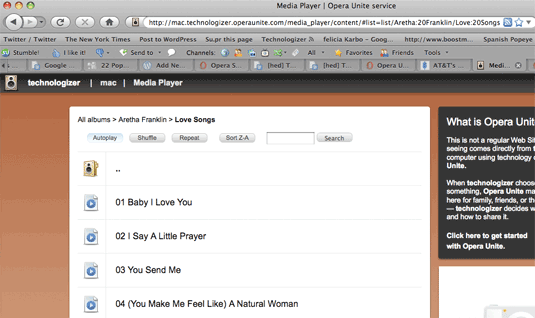Opera’s Web-Changer: Unite, a Web Server Inside Your Browser
By Harry McCracken | Tuesday, June 16, 2009 at 1:37 am
 In Oslo, the Tuesday workday is well underway, and that means that Opera Software has unveiled the revolutionary technology breakthrough it started touting last week. The would-be breakthrough turns out to be called Opera Unite, and a downloadable version of Opera 10 that incorporates it is available now. As blogger Kas Thomas somehow managed to guess, it’s a version of the Opera browser with a built-in Web server. And while it’s impossible to judge at this early date whether it’ll “forever change the fundamental fabric of the Web” as Opera promised, it’s a very big idea. Web browsers have always been about bringing information from the Web onto a PC. With Unite, Opera 10 still does that–but it can also fling information from the PC up to the Internet. Unite is a platform that Opera hopes lots of developers will build applications for, but it launches with some apps that Opera developed itself, including a file-sharing service, a chat room, a music player, a photo-sharing tool, and a note-taker. Once you’ve enabled Unite on a Windows, Mac, or Linux computer running Opera 10, the apps are available from any browser on any Internet-connected computer. (You can choose to password protect them, or to leave them open.) Here’s a copy of Firefox accessing the Opera Unite music player–and thereby letting me listen to my music back home from any computer. (Opera also talks about accessing Unite apps from mobile phones, but my iPhone could see my music collection but didn’t let me listen to it.)
In Oslo, the Tuesday workday is well underway, and that means that Opera Software has unveiled the revolutionary technology breakthrough it started touting last week. The would-be breakthrough turns out to be called Opera Unite, and a downloadable version of Opera 10 that incorporates it is available now. As blogger Kas Thomas somehow managed to guess, it’s a version of the Opera browser with a built-in Web server. And while it’s impossible to judge at this early date whether it’ll “forever change the fundamental fabric of the Web” as Opera promised, it’s a very big idea. Web browsers have always been about bringing information from the Web onto a PC. With Unite, Opera 10 still does that–but it can also fling information from the PC up to the Internet. Unite is a platform that Opera hopes lots of developers will build applications for, but it launches with some apps that Opera developed itself, including a file-sharing service, a chat room, a music player, a photo-sharing tool, and a note-taker. Once you’ve enabled Unite on a Windows, Mac, or Linux computer running Opera 10, the apps are available from any browser on any Internet-connected computer. (You can choose to password protect them, or to leave them open.) Here’s a copy of Firefox accessing the Opera Unite music player–and thereby letting me listen to my music back home from any computer. (Opera also talks about accessing Unite apps from mobile phones, but my iPhone could see my music collection but didn’t let me listen to it.)  I’ve tried the music player, photo viewer, and chat room so far. They’re all relatively basic, and the music player also seems to be a tad glitchy–it’s serving up of the music on my hard drive that I pointed it to, but not all of it. Like all of Unite’s initial services, the apps I’ve tried do things that can be accomplished by other means. But the fact that Unite lets you do them with your browser and no additional software, with setup that takes only a few clicks, is fascinating. And as a potentially major new feature that’s truly unique, it’s reason to check out Opera–although the company’s ambitious talk of Unite transforming the Web will only pan out if every browser adds Unite-like features. I’m participating in an Opera Webcast about Unite later today; more thoughts after I’ve had a chance to hear the company explain the concept and answer questions about it.
I’ve tried the music player, photo viewer, and chat room so far. They’re all relatively basic, and the music player also seems to be a tad glitchy–it’s serving up of the music on my hard drive that I pointed it to, but not all of it. Like all of Unite’s initial services, the apps I’ve tried do things that can be accomplished by other means. But the fact that Unite lets you do them with your browser and no additional software, with setup that takes only a few clicks, is fascinating. And as a potentially major new feature that’s truly unique, it’s reason to check out Opera–although the company’s ambitious talk of Unite transforming the Web will only pan out if every browser adds Unite-like features. I’m participating in an Opera Webcast about Unite later today; more thoughts after I’ve had a chance to hear the company explain the concept and answer questions about it.
12 Comments
Read more:
6 Comments For This Post
6 Trackbacks For This Post
-
Opera Unite: a great idea, wrong center | Ben Werdmuller Web Tools and Strategy Says:
June 16th, 2009 at 4:29 am[…] released Opera Unite, a version of their web browser that also contains a built-in web server. As Harry McCracken explains over at Technologizer: While it’s impossible to judge at this early date whether it’ll “forever change the […]
-
Opera Unites Web Browser and Services | Alec Saunders SquawkBox Says:
June 16th, 2009 at 5:03 am[…] built-in web server, and some services like file, photo and media sharing, chat, and a web server, Unite is touted as a game changing “reinvention” of the web. The idea is that instead of uploading your photos to Flickr to share, for example, you’ll […]
-
andreaitis - de.tech.ting - The Internet is not dead. Or boring. - True/Slant Says:
June 16th, 2009 at 5:46 am[…] via Opera’s Web-changer: Unite, a Web Server Inside your Browser […]
-
server in browser « GORGONET Says:
June 16th, 2009 at 8:07 am[…] Opera’s Web-Changer: Unite, a Web Server Inside Your Browser […]
-
Top Posts « WordPress.com Says:
June 16th, 2009 at 6:15 pm[…] Opera’s Web-Changer: Unite, a Web Server Inside Your Browser In Oslo, the Tuesday workday is well underway, and that means that Opera Software has unveiled the revolutionary […] […]
-
Opera 10: It’s Final. And Worth Trying | Technologizer Says:
September 1st, 2009 at 2:16 am[…] “final” version of Opera 10 isn’t complete: It lacks Unite, the interesting-but-controversial new feature that embeds a Web server in the browser. Unite’s still a separate Opera Labs feature; if it catches on with developers, it’ll […]













June 16th, 2009 at 4:46 am
I thought Windows client licenses limit the number of incoming connections (eg Windows XP home has a limit of 5). So what’s the legal position for Opera Unite?
June 16th, 2009 at 5:34 am
@Pete Austin
Surly that means many online games, not to mention Bit Torrent break the Windows EULA?
June 16th, 2009 at 6:50 am
It would be nice if this would allow you to share Opera on your home PC in such a way that it could be a proxy browser that you could access remotely.
June 16th, 2009 at 8:05 am
i tried opera before, and i found it not as easy to use as mozilla. although i like innovations in the internet experience, there’s no doubt that for me, simpler is better. i’ll stick with mozilla.
June 16th, 2009 at 4:16 pm
this sorta reminds me of the hubbub around brown orifice back in the day. (http://www.wired.com/science/discoveries/news/2000/08/38087 if you don’t remember it.) basically, everyone freaked that the philosophical equivalent of a web server in a page would lead to digital armageddon. (the article linked to DOES actually mention that there might be legitimate uses for turning the web browser into a server.)
but the thing that makes me wonder is, how will distant peers on the net be able to connect to your web browser if you’re behind a NATted firewall (like virtually everyone is these days.) i’m willing to bet there’s a proxy at a routable address somewhere.
Still… interesting technology…
June 16th, 2009 at 10:10 pm
I played with it for a while and I am not sure that it will really catch on. The features are pretty sweet though. I made a little guide to OperaUnite if you want to check it out.